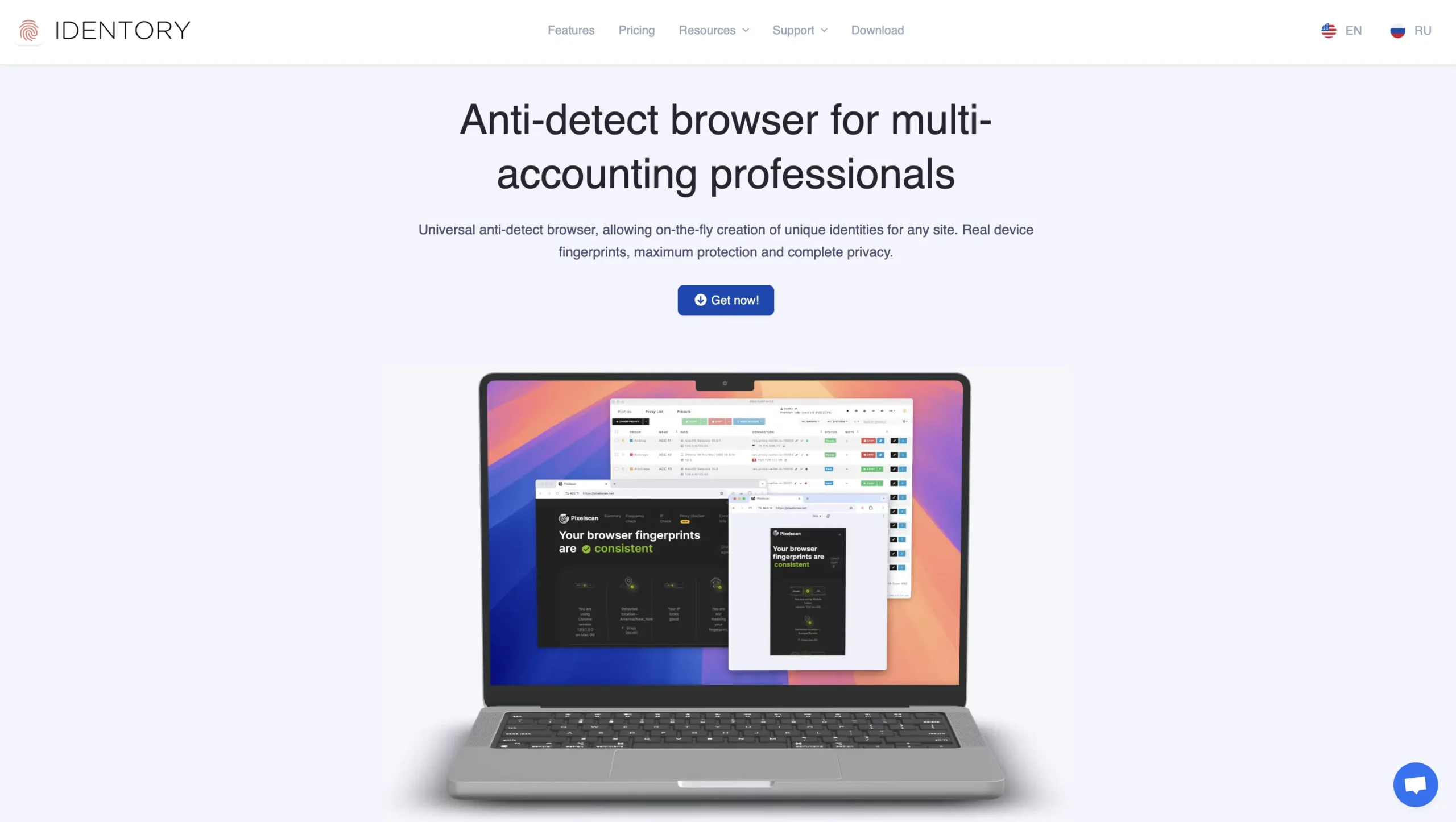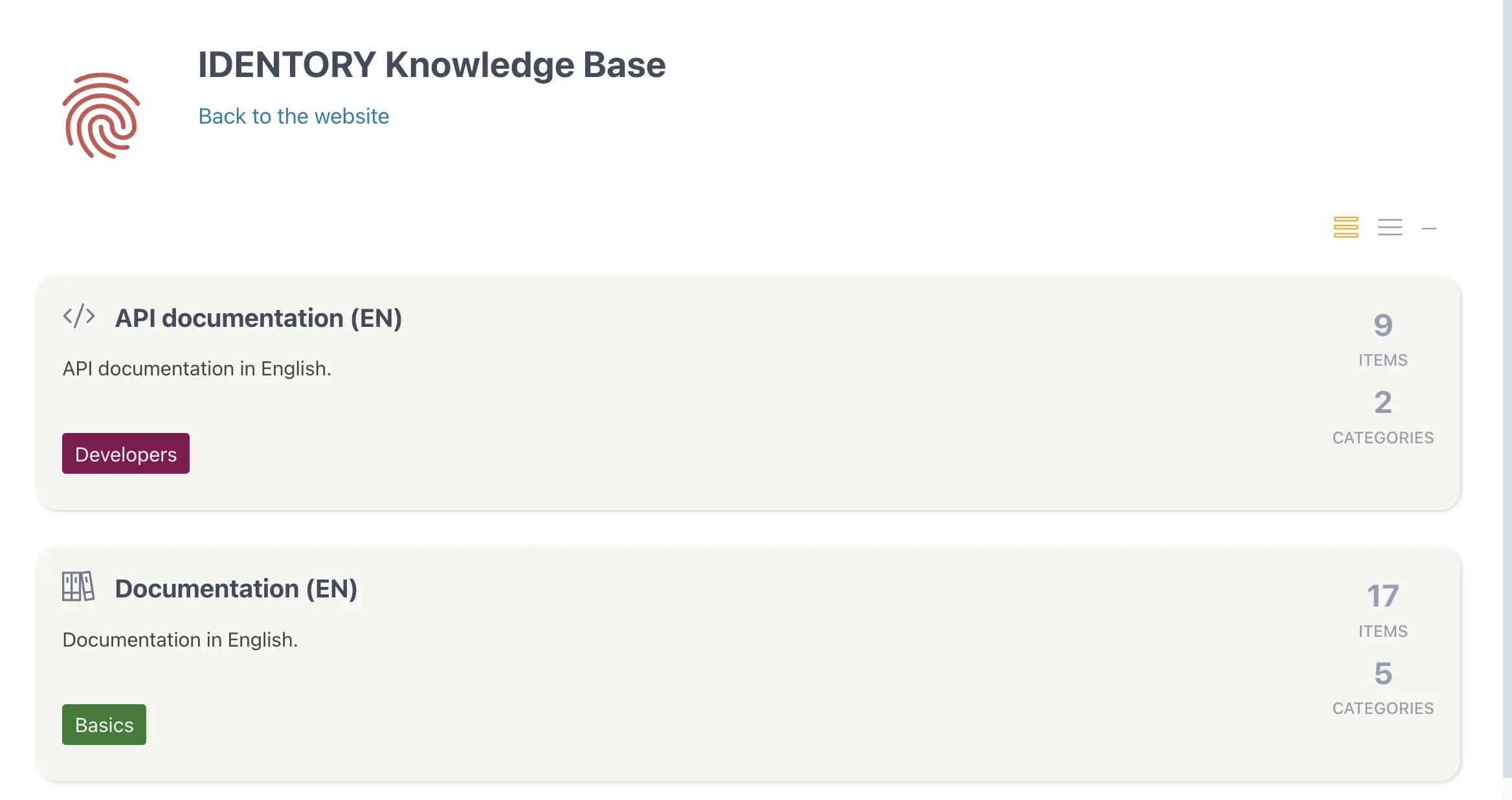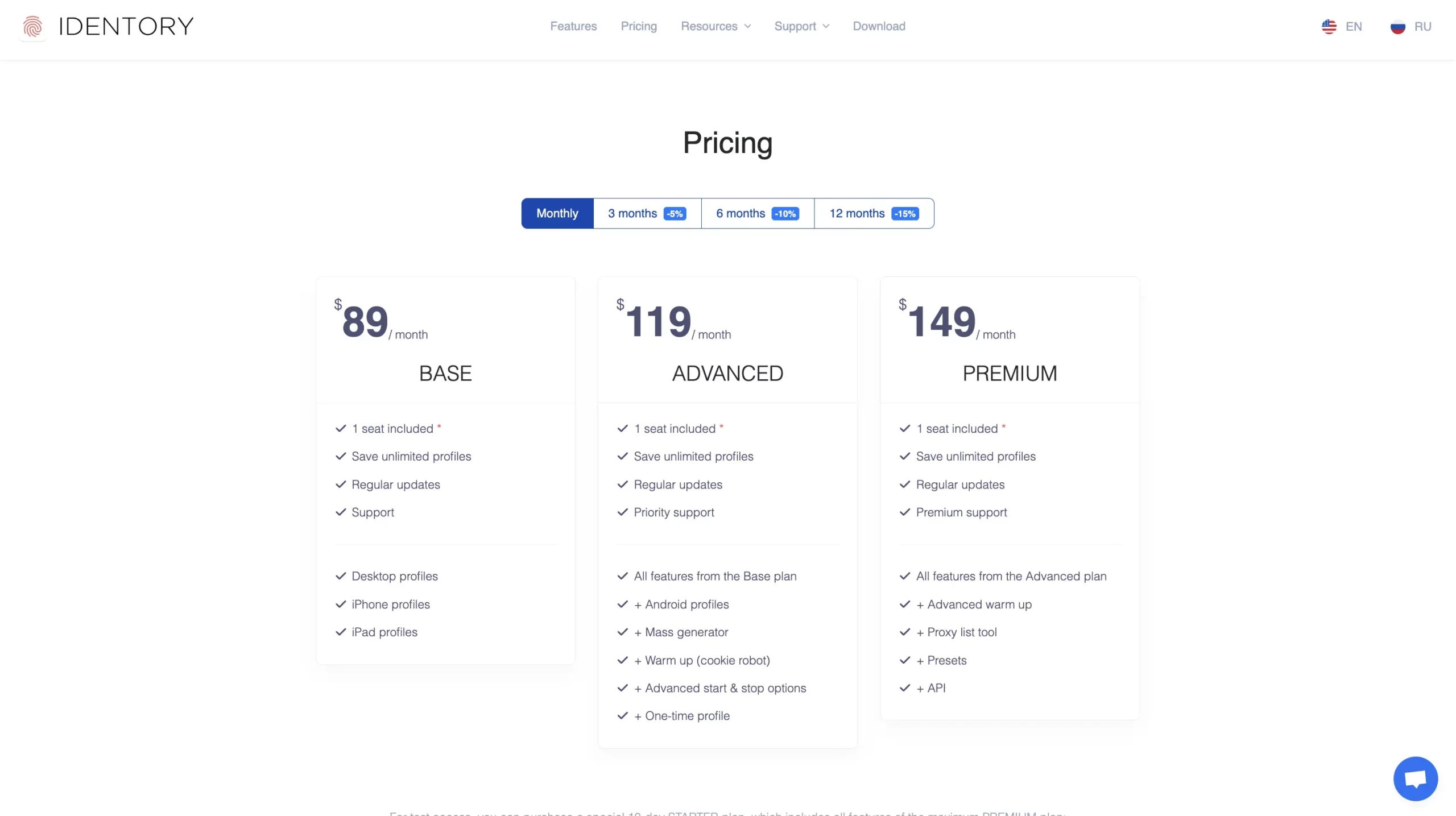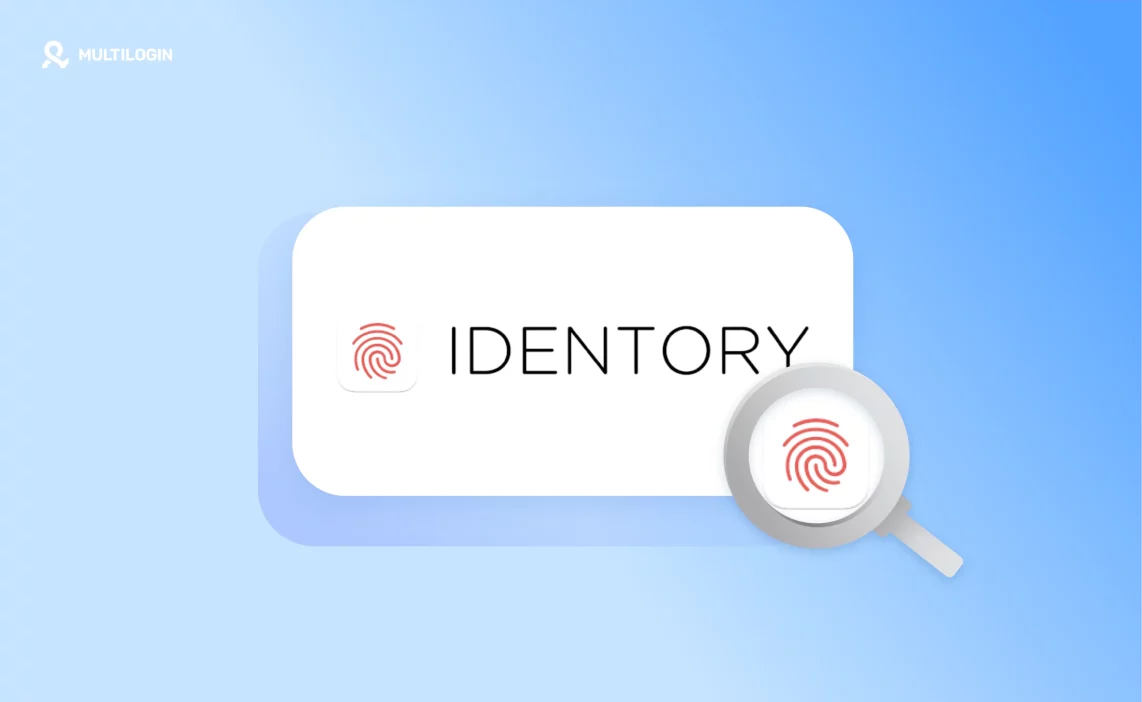Identory User? Get Your Exclusive 50% Discount!
Antidetect browsers are crucial resources for multi-accounting and anonymity. Identory is one representative of solutions like this, but users who are in search of antidetect browsers should consider its gaps and limitations compared to the features of some of the top platforms in the market before purchasing it. In our recent reviews, we’ve reviewed and compared AntBrowser, RoxyBrowser, and Linken Sphere—each with its own strengths and challenges. This time, we’ve turned our focus to Identory.
In this review, you will have your answer to “Should I consider Identory as an antidetect browser in 2026?” and that will allow you to make an informed decision about its suitability for your operations. And if you’re thinking of switching, don’t miss out—Multilogin is offering 50% off your first month.
What is Identory?

Identory is an antidetect browser for the users who need to manage multiple online accounts without detectiuon. This tool creates isolated browser profiles with unique digital fingerprints, that allows users to avoid detection by anti-fraud systems. Identory provides a simple, local-based solution for tasks like e-commerce, affiliate marketing, social media management, and more—without requiring cloud access or complex setup. Identory offers core features for privacy and profile management, but it lacks some of the advanced automation, fingerprint customization, and team collaboration tools offered by top competitors of industry.
Identory: OS support
The operational model is one of the most significant limitations of Identory: it is locally installed software. This means that all your browser profiles and data will be stored directly on your computer, and cloud integration or synchronization is not available. Accessibility, security and scalability wise this is a major limitation for online environment.
Identory’s OS approach, compared to solutions offered by leading antidetect browsers, means you can’t access your profiles from different devices or locations and the responsibility for updates, especially security-critical ones, falls entirely on the user. So you need manually install your Identory update. This update delays can expose your accounts to detection risks and potential bans, making it a less secure and more maintenance-intensive solution compared to platforms that offer automatic, real-time cloud-based updates.
Identory: Web automation
If you need advanced automation to scale your operations or optimize repetitive tasks, then we have bad news: Identory won’t be a fit. This tool does offer some basic automation features and works with certain automation tools, but it won’t be enough for advanced automation, as the tool doesn’t offer built-in support for widely used automation frameworks like Selenium or Postman. This usecase is mainly for the developers or anyone managing multiple accounts at scale; it can be limiting. Identory seems more suited for manual use or simple, predefined actions—rather than offering the kind of flexible API or advanced automation options that power users often need. So, if your workflow depends heavily on complex, script-based automation, Identory might not fully meet your expectations—especially when compared to more advanced antidetect browsers out there.
Identory: Advanced fingerprinting
A core feature of any antidetect browser is its ability to generate unique, undetectable fingerprints. Identory does offer some basic customization—like switching user agents and using a few preset profiles—but it lacks transparency when it comes to the full range of fingerprinting options it supports. Many Identory alternatives provide deep-level control over crucial fingerprint elements such as WebRTC, Canvas, AudioContext, and WebGL. These settings allow users to fine-tune their profiles to better replicate real devices, reducing the chances of getting flagged by anti-bot systems on platforms like TikTok or Reddit.
With Identory, the limited flexibility and unclear coverage of these fingerprinting techniques could leave users exposed to detection. For professionals managing sensitive operations or running multiple accounts in strict environments, this level of fingerprinting may not be enough. Compared to more robust solutions, Identory might fall short in delivering the stealth and control advanced users expect.
Identory: Browser engines & mobile emulation
Identory mainly runs on a Chromium engine, which covers most website needs—but if you’re someone who works across different platforms or needs more flexibility, this might be a drawback. Unlike some of the top antidetect browsers that support multiple engines like Firefox, Identory sticks to Chromium. That’s fine for general use, but if your work demands testing or account management on different engines, it limits your options. It’s a similar story with mobile emulation. While Identory lets you tweak some mobile fingerprint settings, it lacks the more advanced Android/iOS emulation tools that others offer. If your workflows requires mobile stimulation activity or testing mobile interfaces, Identory might not give you everything you need.
Identory: Team collaboration
Collaboration features are crucial for agencies or teams working on multiple accounts. Here, Identory falls a bit short. Profile sharing is possible, but it’s local and manual—which isn’t ideal for remote teams or agencies spread across locations. You won’t find cloud syncing, detailed activity logs, or role-based permissions either—features that are standard in more advanced tools. If you need to assign access, monitor changes, or securely share profiles, Identory may slow you down.
Identory: Proxy management
Identory does support HTTP, HTTPS, and SOCKS5 proxies, and you can assign them to individual profiles. But unlike browsers with built-in proxy solutions, Identory leaves you to find and manage proxies on your own.
That means more work—and more cost. You’ll need to research proxy providers, test for compatibility, security and handle issues yourself. Users, who need a smoother experience with integrated options, this extra layer of setup could be a huge cons when considering Identory.
Identory: Customer support

Identory gives users access to live chat and email support, but in practice, the experience can be hit or miss. Some users have noted that responses take a while, and when they do come, they’re not always helpful or detailed enough—especially when you’re stuck on something technical. The platform also has a small knowledge base, but it doesn’t offer much in the way of step-by-step guides or advanced troubleshooting tips. If you’re someone who likes to sort things out on your own, you might find the resources a little too light.
Compared to other antidetect tools that offer fast replies, larger support teams, and detailed documentation in multiple languages, Identory’s support setup can feel a bit barebones. When you’re managing lots of accounts or working on a tight schedule, this lack of support might slow you down more than you’d expect.
Identory: Pricing

At first glance, Identory’s pricing looks pretty flexible. You can start with a 10-day plan for $49, which sounds useful if you just want to test things out quickly—but honestly, that’s a steep price for just a few days of use.
For longer-term plans, prices drop a bit. If you go month-to-month, it’s $99 per month. But if you commit to a 6-month plan, that monthly rate drops to $85. Go even further with the 12-month subscription, and you’ll pay $70/month, which saves you around 30% compared to monthly payments. So yeah, it’s cheaper the longer you stay—but you’re paying upfront.
Now here’s where it gets a bit tricky. Identory charges extra if you want to use the browser on more than one device or share access with teammates. Need a second “seat”? Expect to pay 30–50% more, depending on the plan. That can quickly push the price higher than expected—especially if you’re working as part of a team or across multiple machines. One more thing: Identory doesn’t come with built-in proxies, so you’ll need to find and pay for your own. That means ongoing monthly costs on top of what you’ve already paid for the software. And if a new version rolls out in the future? There’s a good chance you’ll have to pay again to upgrade. Bottom line? While the one-time or pre-paid pricing looks tempting, make sure to factor in proxy costs, possible upgrade fees, and added device access. It’s not outrageous—but once you add everything up, it’s definitely not “cheap.”
Conclusion: Is Identory worth it in 2026?
That said, if your needs are simple and you don’t mind handling the extra setup manually, it could still work for you. Just make sure you’re fully aware of what’s included—and what isn’t—before making a decision.
Compare Identory with Multilogin now! Discover your best fit & get 50% off your first month!
FAQ
Identory is an antidetect browser designed for people who manage multiple online accounts. It’s popular among marketers, advertisers, and e-commerce professionals who need to avoid detection and keep accounts undetected.
You’ll need to integrate your own proxies. Identory doesn’t come with built-in proxy support, but it does allow you to add your own—whether you’re using HTTP, HTTPS, or SOCKS5.
There’s no free plan at the moment. However, they do offer a short 10-day option for $49, which is helpful if you want to test the software before committing to a longer subscription.
Identory offers three main subscription options:
Base Plan – $89/month
This plan includes 1 user seat and gives you the ability to save unlimited profiles. You’ll get regular updates, basic support, and access to desktop, iPhone, and iPad profiles.Advanced Plan – $119/month
Along with everything in the Base plan, this tier adds Android profile support, a mass profile generator, the warm-up tool (cookie robot), one-time profile use, and advanced start/stop controls. You also get priority support.Premium Plan – $149/month
This is Identory’s most complete package, offering all available features with maximum flexibility—ideal for advanced users or high-volume operations.
These prices don’t include proxies, and there’s no free trial to test things out. So while $89/month might seem affordable, your actual costs can grow depending on your proxy usage and future upgrade needs.
If you’re planning to use heavy automation tools like Selenium or Postman, Identory might not be the best fit. It has some basic support, but more advanced alternatives give you greater control and flexibility.
Compared to tools like Multilogin, Identory covers the basics well. But for more advanced needs—like mobile device emulation, team management, or deeper fingerprint control, Multilogin offers more advanced solutions.

